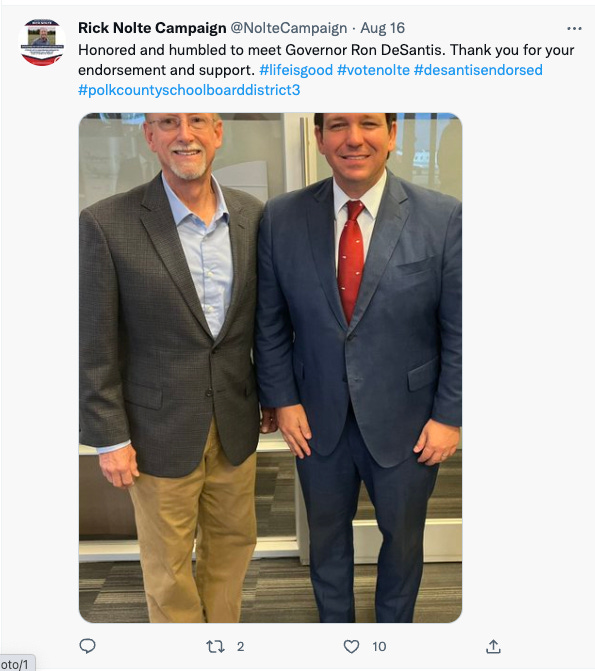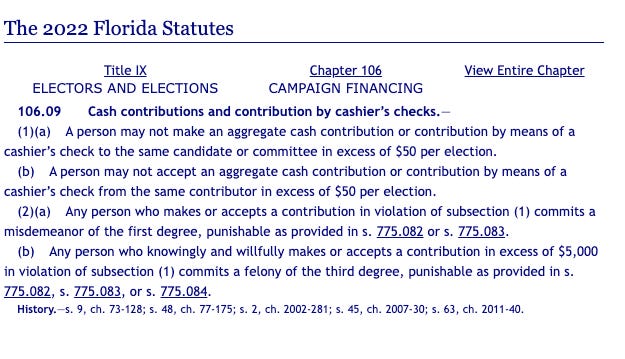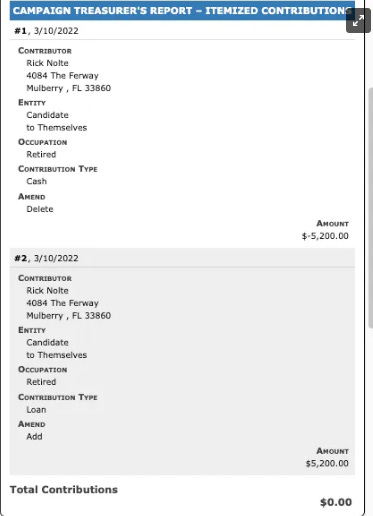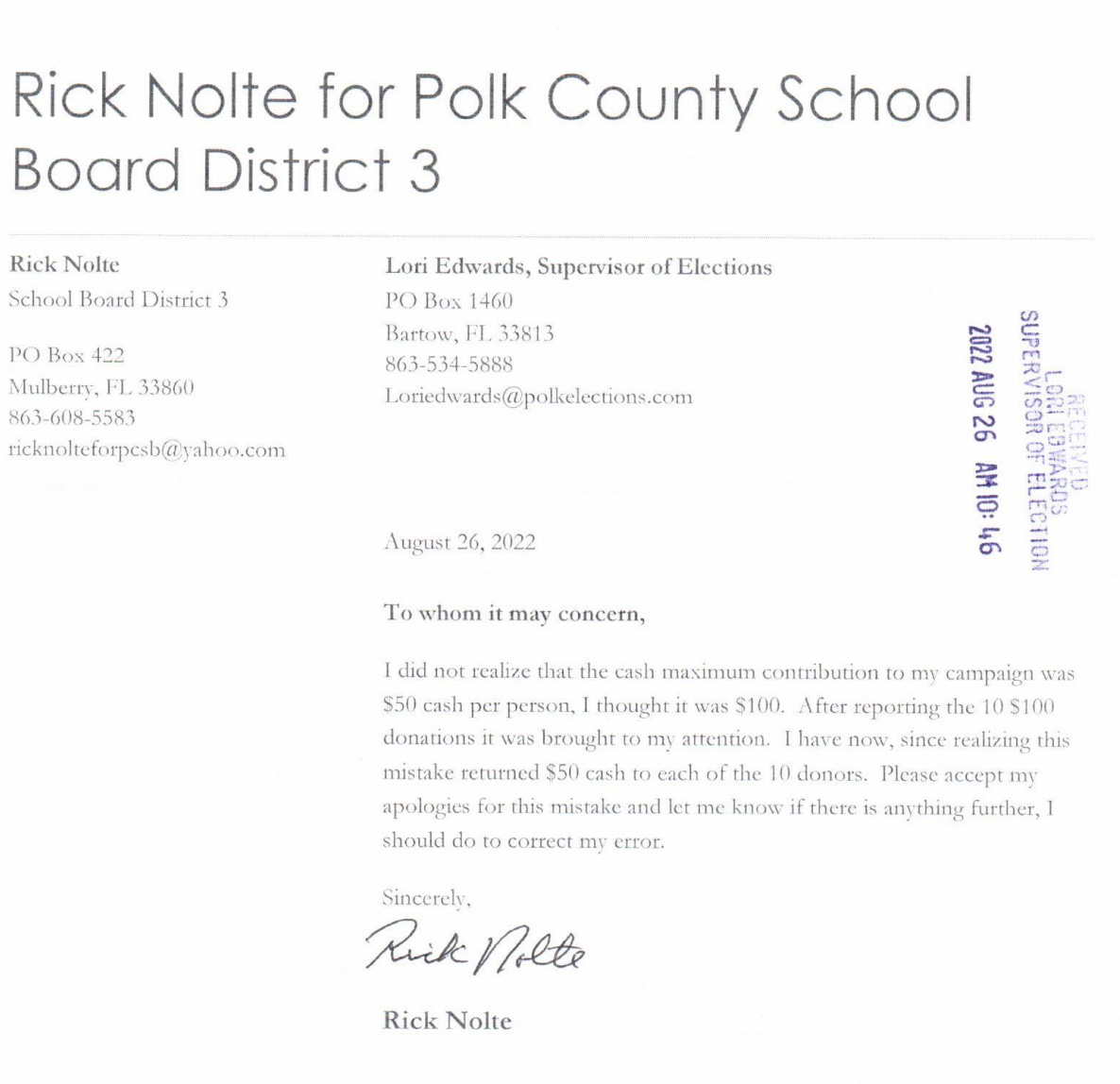Did DeSantis' guy in Polk deposit $5,200 in untrackable cash bills into his School Board campaign account?
To know if Rick Nolte is the felon he claimed to be for months, a fact-finder needs to establish *how* he deposited $5,200 into his campaign account in March and if he acted with "reckless disregard."
Ron DeSantis-endorsed Polk School Board Member Rick Nolte says his campaign finance woes are “being taken care of,” according to reporter Kim Moore of Lakeland Now. Here’s the full exchange from her most recent story:
He was then asked the status of the investigation into his campaign finances.
“I haven’t heard anything other than it’s being taken care of,” Nolte said. When asked who told him that and how it was being taken care of, Nolte smiled and said, “I don’t know. I don’t ask these reporter types of questions.”
We should all have a personal caretaker to clean up our criminal or criminal-adjacent stupidity. But that’s another topic for another time.
A few days ago, Nolte amended 11 reports from his campaign finance record-keeping apocalypse Elmo dumpster fire. Each individual amendment deserves scrutiny; and I’ll try to bring that in coming days.
But let’s just look today at the $5,200 felony cash “contribution” Nolte made to himself, first reported in March, that he has now amended to “loan.”
An amendment of no legal consequence
As I keep saying, it’s illegal to accept any cash campaign contribution or loan greater than $50. It’s a felony to accept any over $5,000. And there are no limits on the non-cash money a candidate can “loan” or “contribute” to their own campaign from personal funds.
So changing the $5,200 cash contribution to a loan should have no legal impact whatsoever. Indeed, a 2003 FEC case and appeals court ruling concerning illegal cash campaign contributions flatly states:
“The statutory definition of ‘‘contribution’’ includes a loan.”
The only conceivable significance of the $5,200 amendment comes from the fact that it does not specify if the “loan” deposit came from cash, check, transfer, cashier’s check, etc. The Polk Supervisor of Elections reporting tool does not give those options for reporting a loan. It seems to assume any loan would be a check. See amendment below:
Thus, we don’t know, at this moment, if Nolte is still claiming to be a campaign felon. You’d think he’d want to tell us.
Nolte can probably expect an administrative law trial — at the very least
That 2003 case provides a hint of what Nolte may expect to experience — if the DeSantis FEC is not hopelessly corrupt — as it works through my complaint about Nolte’s $5,200 cash contribution-turned-loan.
[I can email the case to anyone who is interested. I have it on PDF.]
That case involved a $10,000 transfer directly from the candidate’s personal account into a campaign account. In that sense, it was considered “cash.” An appeals court decided that violation was “technical,” not “willful,” and dismissed the charge.
I’m sure Nolte’s caretaker will say that 2003 case provides precedent that should spare Nolte felony prosecution based on a “technical,” not “willful” violation. That caretaker will be wrong — at least until the underlying facts of Nolte’s deposit have been officially established.
Nolte — if this 2003 case is any guide — is likely to experience an administrative law trial over his self-reported felony violation. That trial will consider two key questions:
What are the underlying facts and “nature of the transaction?” How did the deposit go down? What is the fact record?
Does it represent a “willful,” rather than “technical” violation, characterized by “reckless disregard for whether the action is required or permitted”?
The 2003 case demands that Nolte tells us (or a judge) “the underlying nature of the transaction”
In 2003, the candidate in question underwent an administrative law hearing before an administrative law judge. The candidate legally stipulated prior to his hearing that he transferred $10,000 in “cash” from a personal account to a campaign account.
So that’s already a key difference from Nolte. To my knowledge, Nolte hasn’t offered any legal stipulation or public account of the $5,200 cash campaign deposit.
In the 2003 case, the administrative judge found that a “technical” violation and cleared that candidate of felony wrongdoing.
The Florida Elections Commission (FEC) then overruled the administrative law judge on the grounds that the candidate had literally confessed to the cash felony with his stipulation.
An appeals court then overruled the FEC, agreeing with the administrative law judge’s original position. The specific nature of the deposit and its willfulness defined its criminality, the appeals court found. Note the part in bold from its opinion:
To determine whether there had been an election law violation, it was still necessary for the administrative law judge to understand the underlying nature of the transaction, and if there was a violation, whether the violation was willful.
We agree with the administrative law judge’s approach to the problem. A stipulation ‘‘should not be construed technically, but rather in accordance with its spirit, in furtherance of justice.’’ 2A Fla. Jur.2d
I happen to agree with that outcome.
If Rick Nolte can prove he did an account-to-account transfer, I don’t think he should face a felony charge. That’s a very technical, easy to confuse, violation.
Indeed, based on the 2003 case, I think Nolte will avoid felony charges if:
He wrote a $5,200 personal check and mislabeled it.
Used an account-to-account transfer.
Withdrew cash bills from a personal account and then deposited directly them into campaign account.
The 2003 case seems to consider all of those “technical” violations.
But what if Nolte gathered loose cash bills, untraceable to an account, and deposited them as cash bills into his campaign account?
The 2003 decision does not say if that fact pattern would be a “willful,” rather than “technical,” violation. It simply defines “willful” violation as follows. Note the part in bold:
A willful violation is a knowing violation of the statute. Id. § 106.37. A willful violation also includes a reckless violation, that is, an act showing a reckless disregard for whether the action is required or permitted under chapter 106.
If gathering up loose, untrackable cash bills and illegally depositing them into an account is a “technical” rather than “willful” violation, unworthy of prosecution, then I can’t see any fact pattern that would constitute a felony cash contribution.
I wonder if even the corrupt DeSantis FEC and courts want to essentially legalize unlimited cash contributions in campaigns. If ignorance becomes a blanket defense against open crime, there will be substantial consequences, I suspect.
Reasons to suspect Nolte deposited untraceable cash bills
Until someone puts Nolte under oath and demands to see some deposit slips and account records, we can’t know anything with certainty.
But what public reason has Rick Nolte given voters, citizens, or law enforcement to believe he used an account transfer or check to innocently deposit $5,200 into his campaign account in March?
¯\_(ツ)_/¯
Here’s the closest he’s come, from another Kim Moore article, from way back in September:
When asked about the $5,200 cash donation, Nolte declined to answer.
“I’m not going to answer this because I was told not to,” Nolte said, although he would not say who advised him. “Since it’s being looked at right now I can’t really talk.”
When asked if he meant to write “check” instead of “cash”, [Nolte] said, “Yeah it was a clerical error, I believe.”
That “I believe” hedge is one reason for me to suspect Nolte or his “team” actually just gathered up loose bills to deposit; but suspicion is not proof, obviously.
Here are some additional reasons to suspect a loose cash bills deposit. These reasons for suspicion are also not proof, but they do make me go, hmmmm:
Nolte’s golf business runs on cash bills. See Kim Moore from the same article. Note the bold. I’m sure he accurately accounts for all his taxable cash income.
LkldNow met with Nolte at his golf club repair and manufacturing shop — located in a storage facility on Creative Drive in South Lakeland — where he was tending to customers buying golf clubs with cash. Nolte was reluctant to give an interview and would not allow a recording of the conversation. He did consent to a photograph while he worked.
Nolte has already acknowledged in writing that he took 10 illegal cash contributions of $100 — which is greater than the $50 legal threshold. Cash bills flowed through his campaign, even without the $5,200. See Nolte’s letter to the Supervisor of Elections below. It is very damning for the “reckless disregard” standard, too, as I’ll show you in a moment.
Common sense screams that if Rick Nolte could easily produce a check for $5,200 — or even an innocent transfer — he would have long ago done so to clear his name and end the relentless public scrutiny and mocking that his silence has invited. I was a School Board member and candidate. If I had accidentally declared a felony and could easily prove an innocent explanation, I would do it publicly and within minutes of realizing my problem. Nolte is at eight months and counting — and has been under almost daily scrutiny since August.
Reasons to suspect Rick Nolte acted with “reckless disregard,” rather than just “technical” ignorance
If “non-traceable cash bill deposit” proves to be the “underlying nature of the transaction,” would it meet the “reckless disregard for whether the action is required or permitted” standard?
Here are some reasons to think so, from both before and after the self-declared felony became news:
Nolte has not behaved like an innocent man trying to account for honest mistakes. He’s made no effort to clear his name. He has stonewalled the public and the media at every turn. He’s made no effort to publicly explain anything. Except for the misdemeanor letter to Lori Edwards, he hasn’t said “I’m sorry” and thrown himself on the mercy of authorities and the public. He’s just brazening the whole thing out.
In Nolte’s letter to the Supervisor of Elections, he writes: “I did not realize the cash maximum contribution to my campaign was $50 cash per person. I thought it was $100.” That means at some point in the campaign, long before the self-declared crimes were public, Nolte knew there was a cash limit to contributions that his $5,200 contribution vastly exceeded. To blithely assume the limit did not apply to himself shows “reckless disregard for whether the action is required or permitted.”
The felony is not the only serious problem with Nolte’s campaign financing. It did not occur in a vacuum. There are very serious questions about the legality of Nolte’s campaign finance activity well beyond the cash contributions. See here. Key points:
Several large vague campaign expenditures (three of which went to a Missouri company) through the end of June 2022 totaled $7,567.39. That’s almost exactly the $7,500 fee that Nolte’s fellow CCDF candidates paid criminal campaign manager James Dunn, who Nolte has denied using. If Nolte paid Dunn and then accounted for the spending differently, that’s a crime. I would say it’s also evidence of “reckless disregard” for the law.
One of those strange Missouri company expenditures was for “shirts.” But the Missouri company does not sell shirts, as documented here. Nolte has only recently amended the expenditure to read “signs.”
Nolte’s 11 campaign report amendments seem designed to confuse and conceal from the public what happened, rather than clarifying it. The amendments come unaccompanied by any public explanation or comment. In just one example, Nolte now claims that a $1,000 PAC contribution from “Education for All” on August 16, 2022 did not happen; but that a previously unreported $1,000 PAC contribution from “Friends of Ron DeSantis” on August 17, 2022 did happen. ¯\_(ツ)_/¯. That’s “reckless disregard” for the entire concept of rules-based campaign financing and public accountability.
“Reckless disregard” for the basic requirements of seeking public office
And then there’s this — Nolte’s only real explanation for his incompetence and self-declared criminality. Again, from Kim Moore:
At his golf club shop, Nolte said he did not have his books in front of him, so he couldn’t speak about those checks. He claimed he didn’t know all of the complicated campaign finance laws.
“When you’re non-political like I am – I’ve never run for political office in my life,” he said.
What an insult to every citizen who has ever run for office without cheating or openly declaring crimes.
I’m not aware of any candidate in Polk or Florida history to have used being “non-political” as an excuse for illegally dumping $5,200 in cash bills into an account, if that’s what happened. I’m not aware of any other candidate in Florida, ever, contributing or loaning himself a felony amount of literal campaign cash bills, if that’s what happened.
Nolte’s reckless, willful, self-indulgent laziness is very good reason to throw the full book at him without mercy if it turns out he deposited untraceable cash bills.
As a society, we should actively discourage people this indifferent to the responsibilities of public life and public power from seeking official power. They are dangerous and corrosive to society.
Making an example of Nolte — based on whatever the clearly, legally established facts say — would make a powerful disinfectant for a public life in Polk County and Florida that reeks of corruption and disrespect for the very idea of honest representative government.








Apparently, he did not even try to understand and follow the campaign regulations, insulting every other first-time candidate in the process. Further, has he paid the fine he should have been charged for not filing his final campaign finance report on time?
Every time Nolte opens his mouth, his reckless disgard for anyone or anything astounds me.